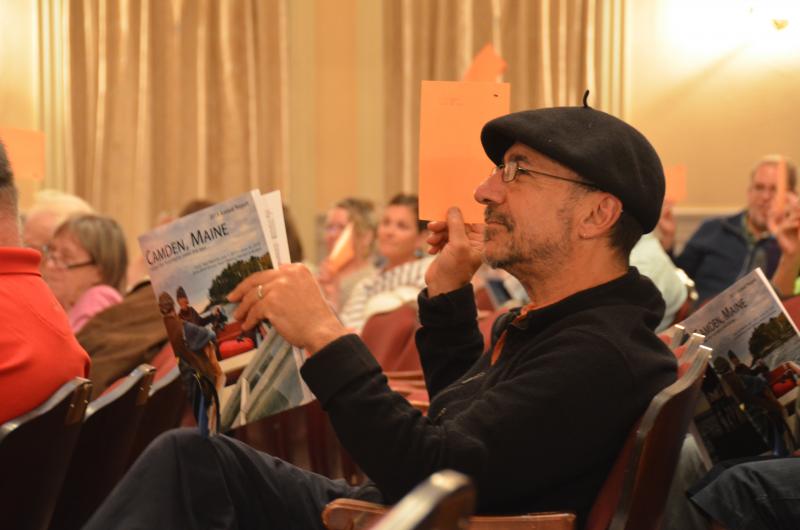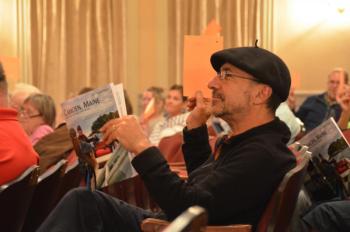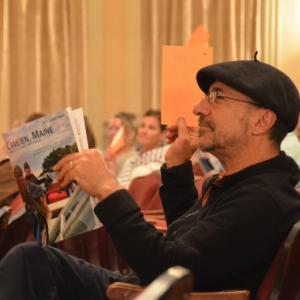Camden considers nonbinding referendum on changing annual town meeting process
CAMDEN — The COVID pandemic upended the traditional manner of annual town meeting in Camden twice over the past 18 months, foreclosing the regular June gathering at which citizens use their voices and hands to signal opinion of how the town spends its money.
Instead, in an effort to avoid contagion, the town switched its budget approval process to that of the secret ballot, and voters went behind the polling curtain to vote yay or nay on Camden’s approximate $10 million budget.
Some liked that new way of tending to municipal business, citing its efficiency; others missed the ritual and open debates that inevitably crop up when citizens assemble and consider how to spend taxpayer money.
The traditional system is a two-day affair for Camden, with the June polls open from 8 a.m. to 8 p.m. at the fire station, and with voters going there to elect candidates, vote on state referendums, school budgets and the occasional municipal warrant article.
Then, the following evening, citizens gather at the Opera House for annual town meeting to vote on municipal budget articles, and other articles pertaining to town business, procedures and policies.
That time-honored tradition has fluctuated in popularity over the recent decades; since town meetings were moved to June to accommodate the July-June fiscal year, the town meetings have recorded smaller turnouts with the citizenry.
With Camden, and like many Midcoast towns, the attendance numbers have risen and fallen. Some years, more than 100 citizens have attended town meeting; other years, 45 and fewer, depending on whether a controversial issue has taken stage.
At the same time, the count of voters turning out in June and November for elections and state, county and municipal warrant articles, has increased, reflecting a growing interest in politics and issues. Correspondingly, there is a rise in absentee ballots, with citizens foregoing not just annual town meeting, but the voting day polls, altogether.
There is now a conversation about whether to do away altogether with the floor vote system for the annual town budget process and replace it with a secret ballot. That impetus, said Charter Commission Chair Deb Dodge, grew from municipal leadership interest. It remains unclear what happens to the remaining non budgetary articles that also appear on the town meeting warrant.
The Charter Commission has been working for two years on updating the town’s charter, which is the governing document of the town. A full discussion about changing the town meeting process did not crop up until more recently, although the Charter Commission report does discuss the idea of moving Camden from a town meeting form of government to a hybrid-council model, akin in some ways to Rockland and Belfast (See sidebar).
But now there is disagreement on how to craft the language to ask voters their opinion on this specific topic. Should the question ask citizens if they want to evaluate the pros and cons on changing the budget approval process, or ask them directly if they want to change that system.
That language debate ensued at the August 24 Camden Select Board meeting, and it has yet to be resolved. Board Chairman Bob Falciani said after the meeting that question will be addressed again at the board’s September meeting.
“The approval of the warrant article exact wording will need to go through the same process as any warrant article including wording approval , public hearing etc.,” he said. “I did not want to get into any detailed wording approval since there was only three of us in attendance. We will address this warrant issue in September.”
At the Aug. 24 meeting, Charter Commission members Deb. Dodge, a former Select Board member herself, and Lowrie Sargent, a former Planning Board member, had presented warrant language for the suggested nonbinding article:
“Do you favor having the Select Board, or a work group appointed by the Select Board, evaluate changing the method of voting on the Annual Town Budget to secret ballot (referendum) instead of the current method of voting in person by show of hands at the open Town Meetings?”
The goal, they said, would be to gauge interest in having Camden evaluate continuance of the secret ballot voting method.
“Any recommendation for a change made by the Select Board or work group to the Charter to vote by referendum (secret ballot) would require public hearings and approval by the voters of the Town at a future Town Meeting,” according to the article’s official explanation.
“It really is a straw poll to gauge interest in exploring [the idea],” said Dodge, to the Select Board, Aug. 24.
She said the word ‘evaluate’ would mean that any favorable result of the nonbinding referendum would result in a, “a more open way to looking at the subject, and less threatening to those who love town meetings.”
Dodge said, “We thought this is a good way to get to the voters to see what they think.”
She cited the towns of Wells and Kennebunk as municipalities that currently vote on budget expenditures via secret ballot.
Wells mails out a 48-page booklet containing budgetary information, “to every voter in town to make sure the voters are well educated before the vote,” said Dodge.
The concept of voting via secret ballot, she said, “deserves a thorough exploration.”
“ The Commission feels that having this nonbinding article included in the warrant would give us an idea of the level of support for making the change,” Dodge said. “Ultimately, such a change would be significant, and all its pros and cons need to be explored and the public given the chance to learn exactly how the whole budget approval process would be altered.”
Another reason for slowing down the decision lies in the fact that the Charter Commission wants to get its other proposed charter changes before the public this November.
“Since our goal is a 2021 vote, the timing would not allow us to do justice to the necessary public discussion on changing to a secret ballot,” said Dodge. “In our view, this would be a huge, substantial change —not as big as changing form of government [from Select Board to Council forms, or hybrids thereof] — but it is, in a way it is a step in that direction. Some say too many people don't understand or even know that we have a town meeting form of government and what that means. This non-binding article actually creates an educational opportunity.”
Some members on the Select Board, however, indicated Aug. 24 they wanted more direct language in the nonbinding referendum.
“I like the idea of asking the question but I think I would prefer to remove one layer, in terms of knowing, what people prefer, rather than they favor us looking into it,” said board member Alison McKellar.
Dodge replied that percentage of people who understand the complexity is 5 percent, at best.
But McKellar and Falciani wanted the citizenry to think about it more immediately and actively, while Dodge and Sargent advocated for a slower approach, and to educate voters on the implications.
“It’s a first step, and incumbent on us to do some education,” said Dodge. “I don’t want people to think it is a simple thing. It takes some work.”
She and Sargent said the charter is a living document, meaning it can be changed by Select Board proposal and public vote; it does not require a procedurally laborious commission process to pose amendments.
Dodge raised a concern that the proposed charter changes have been under development for two years, and adding an up or down vote on the budget process at this point creates a “go or no-go issue.”
“We have worked for two years to update, and modernize our 40 year old charter,” she said. “While it might not be the ‘big change’ that some on the Select Board would like to see, we have done solid work to create a good foundation for any future updates to the charter. Strategically, I think a negative vote (because of disapproval of eliminating the open town meeting) would be throwing out all the hard work that has gone into the charter to date.”
Both McKellar and Town Manager Audra Caler leaned toward getting a decisive municipal vote this, while Dodge and Sargent advocated for such a vote to take place next year.
By the conversation’s end, Falciani said the decision on the language would wait until a Select Board meeting with five members, instead of three. (Absent Aug. 24 were Marc Ratner and Sophie Romana.
The next board meeting is scheduled for Sept. 7.
Reach Editorial Director Lynda Clancy at lyndaclancy@penbaypilot.com; 207-706-6657
Event Date
Address
United States



























